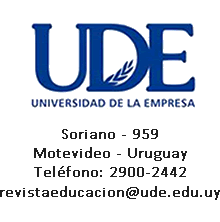Academic perceptions into remote education: challenges and possibilities of the Special Home Exercise Regime
DOI:
https://doi.org/10.48163/rseus.2022.10153-64Keywords:
relato de experiência, ensino remoto, novas tecnologias, desafios, possibilidadesAbstract
This article was based on the experience reports of two students of the Daytime Pedagogy course, at the Federal University of Santa Maria (UFSM) - located in Santa Maria, Rio Grande do Sul, Brazil - who are participating in the Regime de Exercícios Domiciliares Especiais (REDE), which was adopted during the suspension of face-to-face activities from the University, caused because of the Covid-19 pandemic (march/2020). Methodologically, the research qualifies as qualitative, typed like experience report, which is based on the description, interpreting and assimilating about phenomena experienced in a given historical period. From the analysis of article experiences, five categories were listed: "How did the change from face-to-face to remote happen?"; "Challenges of studying at home"; "Difficulties in remote education"; "Methodologies adopted by teachers in remote education: which one helped and which one hindered learning" and "Adequacy regarding the use of new information and communication technologies to manage learning processes''. According to the exhibitions, we realize that academics have much to say about the pandemic, remote education, physical distancing, needs, challenges, preferences and what it is like to "be an academic" on a daily basis. We analyze the importance of the REDE during this process of adaptations by both professors and academics, and in a significant way, as far as possible, keep links and increase learning. We conclude that Information and Communication Technologies (ICTs) were essential and, despite all complications, caused numerous discoveries about something often seen as distant from the academic reality.
Downloads
Additional Files
Published
How to Cite
Issue
Section
License
Copyright (c) 2022 Andréia Jaqueline Devalle Rech

This work is licensed under a Creative Commons Attribution 4.0 International License.
Política para revistas de acceso abierto
Los autores/as que publiquen en esta revista aceptan las siguientes condiciones:
a. Los autores/as conservan los derechos de autor y ceden a la revista el derecho de la primera publicación, con el trabajo registrado con la licencia de atribución de Creative Commons (CC-BY), que permite a terceros utilizar lo publicado siempre que mencionen la autoría del trabajo y a la primera publicación en esta revista.
b. Los autores/as pueden realizar otros acuerdos contractuales independientes y adicionales para la distribución no exclusiva de la versión del artículo publicado en esta revista (p. ej., incluirlo en un repositorio institucional o publicarlo en un libro) siempre que indiquen claramente que el trabajo se publicó por primera vez en esta revista.






















